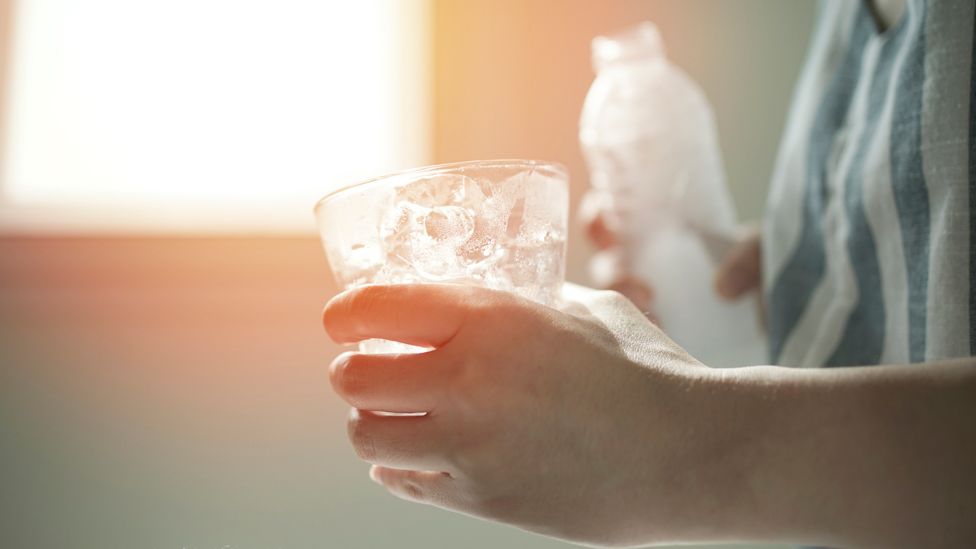ARTICLE AD BOX
 Image source, Getty Images
Image source, Getty Images
The death of a mentally ill teenager who died after drinking an excessive amount of water was preventable, an investigation has found.
The 18-year-old, known at Mr D, was being detained under the Mental Health Act at the time of his death.
An inquiry by the Mental Welfare Commission said he had previously been treated for drinking too much water.
It found several areas where a different course of action could have prevented his death.
The teenager was admitted out-of-hours to an adult mental health service (AMHS) inpatient unit in a health board neighbouring his own on 5 December 2018 as there were no local beds available.
This move was described in the report as a "high-risk action".
On the evening of 7 December he suffered a seizure after drinking too much water and was transferred to intensive care. He died three days later from the consequences of water intoxication.
The report states Mr D had previous contact with child and adolescent mental health services (CAHMS), where he had been treated previously for drinking an excessive quantity of water. He believed this would clean toxins from his system.
Not all of his previous case history had made it into his care plan when he was transferred to the adult unit.
Image source, Getty Images
Suzanne McGuinness, executive director (social work) at the Mental Welfare Commission, said: "This was a tragic death of a young man while he was being cared for in hospital.
"We found that a more assertive approach to the treatment of Mr D's psychotic illness in the two years before his death was warranted. The risks associated with psychotic illness were not coherently managed."
Ms McGuinness also noted concerns with the patients transition from CAMHS to the adult mental health service.
And she expressed alarm about the decision to move Mr D to another health board area during the night.
Ms McGuinness added: "We ask mental health services across Scotland to read this report, consider our findings carefully, and take action where they believe they can make improvements."
The report makes 10 specific recommendations for change to aimed at several bodies including the health boards involved, the Royal College of Psychiatrists, NHS Education Scotland and the Scottish government.
The commission mapped a timeline of Mr D's treatment which dated back to January 2017 when he was admitted to hospital, aged 16, following a seizure caused by drinking too much water.
This had near "fatal consequences" and required treatment in intensive care.
He was diagnosed with early onset psychosis and received two years of community-based CAMHS care.
Mr D was still receiving treatment from the CAMHS specialist psychosis service at the time of his 18th birthday.
Parents' concerns
At the time, the service was moving away from a treatment model that supported young people with first onset psychosis for at least three years from the point of diagnosis.
The new model saw the transition to the adult service begin at the age of 18. Mr D was in the process of transitioning at the time of his death.
The report also found Mr D's parents expressed concerns about the treatment he received on multiple occasions in the months leading up to his death.
On 4 December, the 18-year-old was detained under the Mental Health Act and taken to an AMHS admission unit in an anonymous health board area, but was transferred to a neighbouring area the following day due to a lack of beds.
During the 70 hours of this admission Mr D's case records from his years of contact with the CAMHS community team were unavailable.
Floor wet with water
Relevant clinical information was passed to members of the new treating team and there was also telephone and face-to-face contact between Mr D's parents and the receiving general adult consultant psychiatrist and ward staff.
But not all of this valuable clinical information made it into the care plan, including his history of excessive water consumption.
The report said the alarm was raised at 22:35 on 7 December when nursing staff noticed Mr D's floor was wet with water and he had vomited fluid. The patient told nursing staff he had been drinking water.
He suffered a seizure for around five minutes and the duty doctor attended. The report states Mr D's physical state rapidly deteriorated and he was transferred to an intensive care unit.
The patient was confirmed to be brain dead, three days later, on 10 December.

 1 year ago
39
1 year ago
39








 English (US) ·
English (US) ·